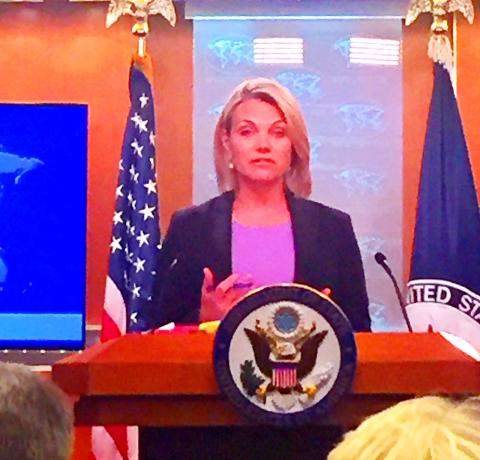Three major US airlines have changed their Web sites to refer to Taiwan only by city names, in response to Beijing’s demand that the changes be made by yesterday.
Reuters on Tuesday reported that the three major US carriers — American Airlines, Delta Air Lines and United Airlines — had agreed to meet China’s request to change the way they refer to Taiwan online.
An unnamed US official was quoted as saying that the US Department of State had on Monday promised China’s embassy in Washington that the carriers’ English and Chinese-language Web sites would only display city names for Taiwan and would remove references to Taiwan as a nation.

Photo: Nadia Tsao, Taipei Times
American Airlines yesterday morning was the first to comply, changing references from “Taipei, Taiwan,” to only “Taipei.”
When approached for questioning, department spokeswoman Heather Nauert said she was not informed of the latest developments and urged reporters to speak directly to the airlines.
However, the US government is opposed to such demands, she added.
“We would oppose a government’s demand on private corporations that private corporations label something the way that the government demands it to do,” she said.
Beijing understood the US government’s position well, Bureau of East Asian and Pacific Affairs spokeswoman Grace Choi said.
The department told Beijing that it was strongly opposed to attempts from China to pressure private US companies into publicly using language indicative of a particular political position, she said, adding that the department’s point of view on the matter had not changed.
Another unnamed department official reiterated that the agency was opposed to Beijing giving orders to US companies, saying that the changes could inconvenience customers.
Comparatively, Chinese companies are free to operate their Web sites without any interference from the US government, the official said, adding that the department has urged other nations to similarly express their concerns to Beijing over its pressure on private companies.
The department would continue to discuss the issue with the Chinese government, but the decision is ultimately in the hands of the companies themselves, the official said.
The Ministry of Foreign Affairs yesterday in a statement said that China has no jurisdiction over Taiwan and that the democratic nation’s existence cannot be denied.
“We will not simply disappear under pressure from China,” the statement said.
The ministry condemned Beijing’s use of political force to interfere with the operations of private foreign businesses as “rude and unreasonable,” saying that it has been in touch with US government departments and representatives, and hopes that the US companies would reverse the changes.
The ministry also expressed thanks to the US firms and other international airlines for showing reluctance to making the changes, despite mounting pressure from China.
Taiwan’s successes in democratization and the protection of human rights have earned it international praise, the ministry said, adding that Taiwanese would continue their way of life without deterrence by China’s threats.
Taiwan calls on the support of like-minded nations to stand up to China’s attempts to interfere with private firms, the statement added.
Additional reporting by Lu Yi-hsuan

The Ministry of Foreign Affairs (MOFA) yesterday said it is closely monitoring developments in Venezuela, and would continue to cooperate with democratic allies and work together for regional and global security, stability, and prosperity. The remarks came after the US on Saturday launched a series of airstrikes in Venezuela and kidnapped Venezuelan President Nicolas Maduro, who was later flown to New York along with his wife. The pair face US charges related to drug trafficking and alleged cooperation with gangs designated as terrorist organizations. Maduro has denied the allegations. The ministry said that it is closely monitoring the political and economic situation

UNRELENTING: China attempted cyberattacks on Taiwan’s critical infrastructure 2.63 million times per day last year, up from 1.23 million in 2023, the NSB said China’s cyberarmy has long engaged in cyberattacks against Taiwan’s critical infrastructure, employing diverse and evolving tactics, the National Security Bureau (NSB) said yesterday, adding that cyberattacks on critical energy infrastructure last year increased 10-fold compared with the previous year. The NSB yesterday released a report titled Analysis on China’s Cyber Threats to Taiwan’s Critical Infrastructure in 2025, outlining the number of cyberattacks, major tactics and hacker groups. Taiwan’s national intelligence community identified a large number of cybersecurity incidents last year, the bureau said in a statement. China’s cyberarmy last year launched an average of 2.63 million intrusion attempts per day targeting Taiwan’s critical

‘SLICING METHOD’: In the event of a blockade, the China Coast Guard would intercept Taiwanese ships while its navy would seek to deter foreign intervention China’s military drills around Taiwan this week signaled potential strategies to cut the nation off from energy supplies and foreign military assistance, a US think tank report said. The Chinese People’s Liberation Army (PLA) conducted what it called “Justice Mission 2025” exercises from Monday to Tuesday in five maritime zones and airspace around Taiwan, calling them a warning to “Taiwanese independence” forces. In a report released on Wednesday, the Institute for the Study of War said the exercises effectively simulated blocking shipping routes to major port cities, including Kaohsiung, Keelung and Hualien. Taiwan would be highly vulnerable under such a blockade, because it

UNDER WAY: The contract for advanced sensor systems would be fulfilled in Florida, and is expected to be completed by June 2031, the Pentagon said Lockheed Martin has been given a contract involving foreign military sales to Taiwan to meet what Washington calls “an urgent operational need” of Taiwan’s air force, the Pentagon said on Wednesday. The contract has a ceiling value of US$328.5 million, with US$157.3 million in foreign military sales funds obligated at the time of award, the Pentagon said in a statement. “This contract provides for the procurement and delivery of 55 Infrared Search and Track Legion Enhanced Sensor Pods, processors, pod containers and processor containers required to meet the urgent operational need of the Taiwan air force,” it said. The contract’s work would be